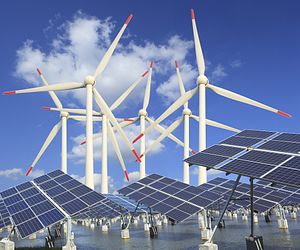U.S. Commerce Secretary Penny Pritzker is leading a group of 24 U.S. businesses to China seeking increased cooperation on clean energy. The group is the first “presidential designated” trade mission to visit China since Barack Obama took office. Companies represented in the delegation include Alcoa, GE, Lockheed Martin, Honeywell, and Qualcomm Technologies.
In a statement on the delegation, the U.S. Department of Commerce noted that “China offers vast opportunities for U.S. businesses with deep expertise in clean and energy efficient technology.” The purpose of the trip, the statement said, is to connect U.S. companies with “opportunities in the green infrastructure and energy efficiency industries” in China while also helping “introduce Chinese investors, entrepreneurs and innovators to the [United States’] clean energy technology market.”
The group met with Chinese Premier Li Keqiang in Beijing, who was also bullish on the possibilities for increased cooperation on clean energy. “China is accelerating a new type of ‘people-oriented’ urbanization plan, which offers a huge market for the advanced technology and management experience of the United States,” Li told the delegation, according to Xinhua. He also urged U.S. and Chinese companies to consider taking their partnership abroad to third country markets.
Besides the economic benefits of cooperation, the Department of Commerce emphasized the Obama administration’s commitment to fighting climate change through clean energy development. “This trade mission represents a major commitment by the Obama Administration to meeting the global challenge of climate change,” the department explained. The statement added that the mission is the “first step” in realizing the goals laid out by Obama and Chinese President Xi Jinping in their joint climate change announcement, made in November 2014.
U.S.-China cooperation on climate change has come a long way. In December 2009, the U.S. and China butted heads at the UN Climate Change Conference in Copenhagen. In a real sense, the failure to reach an accord at Copenhagen (along with reported snubs from the Chinese delegation) spelled the end of Obama’s original plan to prioritize engagement over deterrence in his approach to China.
Today, however, climate change marks a bright spot in an otherwise testy relationship. The November 2014 announcement was a pleasant surprise that took the focus off thornier questions (like China’s approach to territorial disputes or cyber issues) during Obama’s summit with Xi. China’s domestic “war on pollution” paved the way for greater international commitments from Beijing on reducing emissions, while Obama seems to have returned to climate change as a legacy issue as his presidency winds down.
While the November 2014 announcement on climate change was largely noteworthy for the targets each side set, it also contained a blueprint for U.S.-China cooperation on clean energy. In particular, the announcement focused on cooperation to advance “clean coal” technology, where carbon emissions are captured and stored underground. Given the reliance on coal for energy around the world, perfecting “clean coal” could be even more important for reducing emissions than developing clean energy sources.
The two sides also pledged to cooperate in building “smart grids” and “smart cities” that boost energy efficiency, a major focus of Pritzker’s delegation. The U.S. plans to host three Chinese delegations in 2015 to showcase smart grid and carbon capture, use, and sequestration (CCUS) technology.
With China poised to overtake the U.S. as the greatest contributor to global emissions since 1990, Beijing wants to show the world that it takes emissions reduction seriously. The U.S., meanwhile, is working to reclaim global leadership on an issue where Washington has historically lagged behind. That makes cooperation on climate change – and particularly on clean energy – an easy way to build up positive feelings before Xi’s September visit to the United States.
































